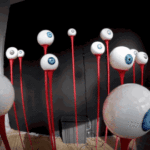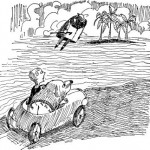[note: if you have not yet played BioShock and plan to, you may want to wait on reading this, as it contains spoilers]
As an Xbox achievements addict, I was recently attempting to replay BioShock, to scoop up all the points I had missed. Unfortunately, I was having trouble getting into it a second time. I had to try and figure out why. I’m an infamous re-player, not just of games (you and I both don’t want to count the number of times I’ve played through Deus Ex) but I re-read books and re-watch TV and movies constantly (I’ve even re-read the Diablo manual a few times… I love the story in that thing). I have a number of friends who are enjoying their replays of the game, why was I having some much trouble making myself push through the second run of BioShock, a game which I thoroughly enjoyed on the first play through.
To figure it out, I first through of what it is that attracts me to those things I re-read. Humor, plot, philosophy. BioShock has those in spades. What was missing? Then I realized the very thing that would have me glued to even the crappiest TV show was something that BioShock lacked — character development. Not only was the main player character shallower then most puddles, but his choices were one-dimensional and the supporting cast seemed to have developed at some point, but when the game starts, they pretty much stay glued into place on their character arcs.
The problem isn’t the linier plot, that’s common enough in games and in BioShock it’s (at least) half the point. No, at issue is the player character. The “faceless voiceless nameless dork,” to use Yahtzee’s term, whom you play as throughout the game lacks any sort of development arc. Here is a man with chains tattooed on his wrists, who is in a plane crash, stumbles across a wondrous underwater city, is beset by strange people and thought-provoking ideas, but he barely reacts. Yes, the story explains, he is programmed, but even so, he has human elements and a memory and therefore some sort of personality. It seems wholly unlikely that Mr. Chain-Wrists would take this in stride. There might be a little resistance towards the end of the game, but the plot and the game’s mechanics dictate a static character.
This odd resistance towards character development is built into the game at every level. For example, when I started off the game, I killed the Little Sisters. Persuaded by Atlas and the fact that they looked more like little demons then little girls, I heartlessly decided to harvest them. Admit it, if you were faced by beings with glowing eyes, horrifyingly creepy voices, and a thirst for the blood of dead bodies, you’d think they were evil too. Hell, as far as I’m concerned that’s one step away from zombie-ville. As the plot progressed and I learned more about Rapture, ADAM and the Little Sisters themselves, I came to realize my mistake. These were little girls after all, they had been altered and their lives destroyed, but I had the power to save them. If this were a novel, it would be the classic turning point for Chain-Wrists’ character arc: an epiphany or revelation. Yet, with the exception of a change in basic rewards, there was no change in how the game reacted to me. The end of the game came along and any thought I had invested into my character was nixed, as it became apparent that harvesting even one Little Sister would put me on the path to become an unstoppable world-killing super-villain. They had made the path between good and evil a binary one, with a switch flipped at the very first Little Sister. A choice like that, where you make it without even having the full story, is barely a choice at all. It is ironic that a game so steeped in philosophy would be unable to recognize the moral grays. Despite its role playing elements, BioShock does not even give you the mental wiggle room to imagine character development.
BioShock has no character development. In other games you can infer development, through the ways that NPCs react to the player. In others, it may simply be the game developers giving you enough room to imagine that your character is developing in some way, in accordance to how you play and perceive feelings and ideas throughout the game, a sort of gamer response. Even in my (long sold off) World of Warcraft account, I could imagine my characters having some sort of development, in accordance with the quests they took, their allegiances and alignment changes. Yet BioShock shuts down even an imaginary character development. It’s not the only one, many games, especially first person shooters, seem to leave the player character out in the cold. For some reason, many developers believe that if they put you behind the gun, that frees them from having to create a character. This can be seen even in the leaders of the industry, the cold and silent Gordon Freeman, The DOOM series, Unreal, even the vaunted Master Chief is little more than a cardboard cut-out of a hero. It’s not just FPSs either, just recently I picked up Crackdown, which is a lot of fun, but you often end up killing civilians with the only result being a temporary period where the police shoot you. Think about the untapped potential there for a development of the character, for taking what is a good game and turning it into an amazing one.
Of course, you can argue that the industry is free from the need to create a main character for their games. However, you’d be wrong. Video games provide a new form and format for storytelling, but this does not free them of the basic responsibilities involved in creating a narrative. Think back to the best games you’ve played, Thief, Grim Fandigo, Deus Ex and the more recent Mass Effect. What makes them memorable? Their player characters: Garrett, Manny Calavera, JC Denton, and the ever mutable Commander Shepard, are what makes these games so good, and what gives them staying power. The impact of an effective character arc on a story is remarkable, and should be inspiring game developers to continue to create good characters, as that is what will make their games last.
While the in-game events of Half-Life are a technological marvel, their value for storytelling is lost. Think about how boring it would be to watch a movie where the character has no development, never changes, and you never see his face. Why do you think the DOOM movie was such a failure? Why do you think the fans were so excited to try and see the Master Chief’s face? TV gets it, everything from Sitcoms to Sci-Fi understand the value of effective characters, that’s what lies behind the success of shows like Battlestar Galactica, you’re watching a show about people, fallible and human. Characterization and development are most important things storytelling in every other medium can have, but in games it seems as if developers feel that leaving the main character out gives you a better experience.
I disagree. Gamers deserve good narratives, and for that character is essential. This is where the future of gaming lies. While game provide all sorts of new ways to tell stories and a revolution in the way they can be structured and laid out, they still require the same things that make any good story. Characters with depth are essential, they need to have feelings and they need to make you feel something about them. They need to have value, otherwise what’s the point?
This was cross-posted to The Escapist’s forums, as I wanted to see what sort of feedback I’d get over there.






























[…] aramzs Tuesday March 2, 2010 Share If you read my blog back in its RWV days, you may recall my post about the need for player characters to speak and how a failure to do so, as in BioShock, was detrimental to the […]